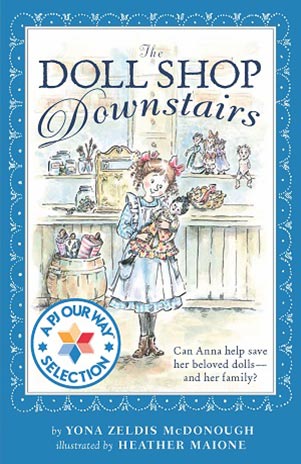The Doll Shop Downstairs
Average Rating
What the Book is About
Nine-year-old Anna lives with her Russian immigrant Jewish parents and two sisters above her family's doll repair shop on the lower east side in New York City. When World War I interrupts their supply of spare doll parts from Germany and the business is threatened, Anna comes up with the idea of making their own dolls and helping with the war effort at the same time. Whether or not they have siblings, kids will relate to middle child Anna, who has to deal with a bossy older sister and babyish younger sister. The book is based on the true story of the inventor of “Madame Alexander” dolls, which still exist today.
Jewish Content & Values
- Anna's parents and friends' parents speak Yiddish, and the family lives in a Jewish neighborhood.
- The family celebrates Jewish holidays including the Jewish New Year, Rosh Hashanah; the Day of Atonement, Yom Kippur; and the Feast of Tabernacles, Sukkot.
- Anna works hard to repair the doll she loves, so when her real owner comes to take her back, Anna is devastated. However, she demonstrates the Jewish value of tzedek, behaving with integrity and righteousness.
Positive Role Models
- Anna uses her ingenuity and creativity to solve her family’s financial problem. She also behaves well when she must return her beloved doll to its rightful owner.
- Papa is honest and writes regularly to the owners of the dolls left at the shop in order to try to return them. Even though times are hard, he expresses gratitude for what the family has. He treats his daughters with respect and talks to them about serious matters, such as the war and the family business.
- Mama convinces Papa to listen to Anna’s idea about making dolls. She works in the family business, keeps a Jewish home, and makes comments that show she has religious faith.
Content Advisory
Talk it Over!
More for You
The Doll Shop Downstairs is based loosely on the story of real-life doll manufacturer Beatrice Alexander, creator of the Madame Alexander dolls. Beatrice Alexander isn’t the only Jewish toy manufacturer. Elliot Handler founded Mattel Toys, famous for Hot Wheels and Barbie – who was designed by his wife, Ruth. Another husband and wife team, Fred and Barbara Kort, founded the Imperial Toy Corporation, which at one point manufactured over 800 toys and games. And New York’s famous FAO Schwarz toy store was founded by German-Jewish immigrant Frederick August Otto Schwarz.
What the Book is About
Nine-year-old Anna lives with her Russian immigrant Jewish parents and two sisters above her family's doll repair shop on the lower east side in New York City. When World War I interrupts their supply of spare doll parts from Germany and the business is threatened, Anna comes up with the idea of making their own dolls and helping with the war effort at the same time. Whether or not they have siblings, kids will relate to middle child Anna, who has to deal with a bossy older sister and babyish younger sister. The book is based on the true story of the inventor of “Madame Alexander” dolls, which still exist today.
Jewish Content & Values
- Anna's parents and friends' parents speak Yiddish, and the family lives in a Jewish neighborhood.
- The family celebrates Jewish holidays including the Jewish New Year, Rosh Hashanah; the Day of Atonement, Yom Kippur; and the Feast of Tabernacles, Sukkot.
- Anna works hard to repair the doll she loves, so when her real owner comes to take her back, Anna is devastated. However, she demonstrates the Jewish value of tzedek, behaving with integrity and righteousness.
Positive Role Models
- Anna uses her ingenuity and creativity to solve her family’s financial problem. She also behaves well when she must return her beloved doll to its rightful owner.
- Papa is honest and writes regularly to the owners of the dolls left at the shop in order to try to return them. Even though times are hard, he expresses gratitude for what the family has. He treats his daughters with respect and talks to them about serious matters, such as the war and the family business.
- Mama convinces Papa to listen to Anna’s idea about making dolls. She works in the family business, keeps a Jewish home, and makes comments that show she has religious faith.
Content Advisory
Talk it Over!
More for You
The Doll Shop Downstairs is based loosely on the story of real-life doll manufacturer Beatrice Alexander, creator of the Madame Alexander dolls. Beatrice Alexander isn’t the only Jewish toy manufacturer. Elliot Handler founded Mattel Toys, famous for Hot Wheels and Barbie – who was designed by his wife, Ruth. Another husband and wife team, Fred and Barbara Kort, founded the Imperial Toy Corporation, which at one point manufactured over 800 toys and games. And New York’s famous FAO Schwarz toy store was founded by German-Jewish immigrant Frederick August Otto Schwarz.

